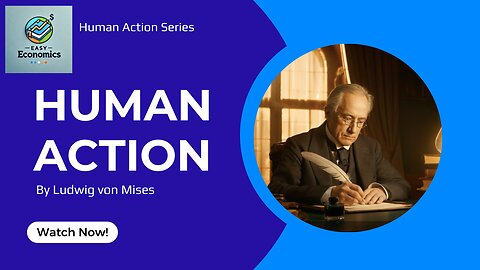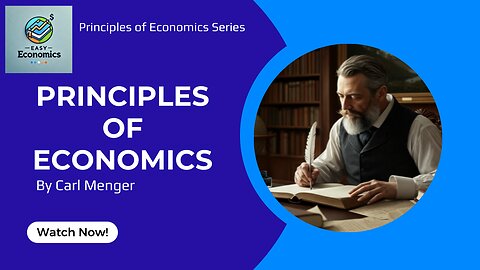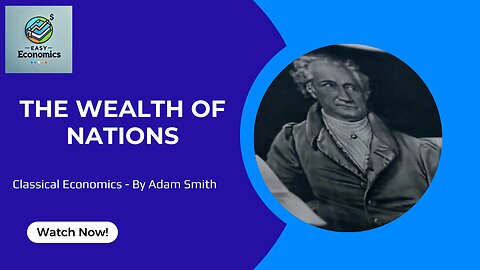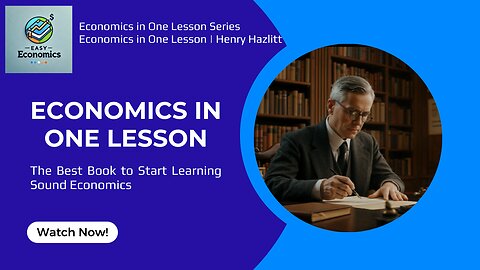
Must Read Economics Books
4 videos
Updated 15 days ago
Dive into the foundational ideas of economics with this curated playlist featuring the most influential books from Classical and Austrian economics. Explore the timeless principles of free markets, individual liberty, and the dynamics of supply and demand that shaped modern economic thought. From Adam Smith’s groundbreaking The Wealth of Nations to Ludwig von Mises’ profound Human Action, this playlist simplifies complex theories and highlights their relevance today. Perfect for students, enthusiasts, and anyone curious about how economies function at their core, these videos make economic classics easy to understand and engaging to learn.
-
Economics in One Lesson - The Ultimate Book to Start Learning Sound Economics
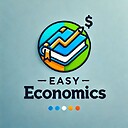 EasyEconomicsDo you want to start learning real economics and get the book ‘Economics in One Lesson’? Get it here: https://amzn.to/41WDZcb Discover the timeless wisdom of Henry Hazlitt’s Economics in One Lesson, a groundbreaking book that has shaped how we think about economic decisions since its publication in 1946. Hazlitt explains core principles like the “Broken Window Fallacy,” teaching us to look beyond immediate effects and consider the hidden, long-term consequences of economic actions. Explore key concepts like opportunity cost—the unseen trade-offs in every decision—and how market prices act as vital signals to allocate resources efficiently. Written in clear, accessible language, Economics in One Lesson simplifies complex ideas, making it an essential read for anyone curious about economics, from beginners to seasoned readers. In today’s world of increasing government intervention, Hazlitt’s defense of free markets and individual liberty is more relevant than ever. Watch this video to learn why Hazlitt’s lessons still resonate and how they can change the way you think about policies and the economy. 00:00 - Introduction to "Economics in One Lesson” 00:56 - The Broken Window Fallacy – Seeing the True Costs of Policy 02:16 - The Importance of Opportunity Cost – What You Give Up 03-09 - The Role of Prices and Markets in Allocating Resources 03:53 - Why "Economics in One Lesson" is Essential Reading12 views
EasyEconomicsDo you want to start learning real economics and get the book ‘Economics in One Lesson’? Get it here: https://amzn.to/41WDZcb Discover the timeless wisdom of Henry Hazlitt’s Economics in One Lesson, a groundbreaking book that has shaped how we think about economic decisions since its publication in 1946. Hazlitt explains core principles like the “Broken Window Fallacy,” teaching us to look beyond immediate effects and consider the hidden, long-term consequences of economic actions. Explore key concepts like opportunity cost—the unseen trade-offs in every decision—and how market prices act as vital signals to allocate resources efficiently. Written in clear, accessible language, Economics in One Lesson simplifies complex ideas, making it an essential read for anyone curious about economics, from beginners to seasoned readers. In today’s world of increasing government intervention, Hazlitt’s defense of free markets and individual liberty is more relevant than ever. Watch this video to learn why Hazlitt’s lessons still resonate and how they can change the way you think about policies and the economy. 00:00 - Introduction to "Economics in One Lesson” 00:56 - The Broken Window Fallacy – Seeing the True Costs of Policy 02:16 - The Importance of Opportunity Cost – What You Give Up 03-09 - The Role of Prices and Markets in Allocating Resources 03:53 - Why "Economics in One Lesson" is Essential Reading12 views -
Human Action - A Masterpiece of Economic Thought by Ludwig von Mises
 EasyEconomicsAre you interested to read the original book? Get ‘Human Action’ by Ludwig von Mises now: https://amzn.to/4fD9zP6 In this video, we explore Ludwig von Mises’ groundbreaking work Human Action—a masterpiece of economic thought from the Austrian School. Mises revolutionized how we understand economics by focusing on individual choices and subjective value rather than abstract systems. He demonstrated that free markets thrive because they reflect the decisions of millions, while centralized systems like socialism fail due to the lack of proper calculation and incentives. We’ll break down core concepts like the power of free markets, the economic calculation problem, and how individual decision-making drives innovation and prosperity. Mises also emphasized that economics is about more than money—it’s about freedom, morality, and human dignity. Whether you’re curious about markets or want to understand the forces shaping the world, this video simplifies Mises’ transformative ideas into bite-sized, easy-to-follow explanations. Join us to discover why Human Action remains essential for understanding both economics and humanity today. 00:00 - Introduction to Human Action 00:36 - Importance of 'Human Action' today 00:57 - Praxeology – Understanding Human Behavior 01:40 - The Power of Free Markets 02:32 - Economic Calculation and Why Socialism Fails 03:12 - Human Action and the Individual 03:46 - Why 'Human Action' is a Must-Read20 views 1 comment
EasyEconomicsAre you interested to read the original book? Get ‘Human Action’ by Ludwig von Mises now: https://amzn.to/4fD9zP6 In this video, we explore Ludwig von Mises’ groundbreaking work Human Action—a masterpiece of economic thought from the Austrian School. Mises revolutionized how we understand economics by focusing on individual choices and subjective value rather than abstract systems. He demonstrated that free markets thrive because they reflect the decisions of millions, while centralized systems like socialism fail due to the lack of proper calculation and incentives. We’ll break down core concepts like the power of free markets, the economic calculation problem, and how individual decision-making drives innovation and prosperity. Mises also emphasized that economics is about more than money—it’s about freedom, morality, and human dignity. Whether you’re curious about markets or want to understand the forces shaping the world, this video simplifies Mises’ transformative ideas into bite-sized, easy-to-follow explanations. Join us to discover why Human Action remains essential for understanding both economics and humanity today. 00:00 - Introduction to Human Action 00:36 - Importance of 'Human Action' today 00:57 - Praxeology – Understanding Human Behavior 01:40 - The Power of Free Markets 02:32 - Economic Calculation and Why Socialism Fails 03:12 - Human Action and the Individual 03:46 - Why 'Human Action' is a Must-Read20 views 1 comment -
Principles of Economics by Carl Menger - The Foundation of the Austrian School
 EasyEconomicsAre you interested to read the original book? Get ‘Principles of Economics’ by Carl Menger now: https://amzn.to/41Te3Ov In this video, we explore Carl Menger’s Principles of Economics, the foundational work of the Austrian School of Economics. Published in 1871, Menger revolutionized economic thought by shifting the focus from production costs to human decision-making. His key ideas, including subjective value and marginal utility, explain how value is determined by personal needs and preferences, not inherent properties. Menger demonstrated that as we consume more of something, its value decreases—this helps us understand why prices fluctuate based on scarcity. He also emphasized the role of individuals in shaping the economy, rather than abstract economic forces. Menger’s groundbreaking work continues to influence modern economics by highlighting the importance of entrepreneurship, choice, and time in economic decisions. Whether you're new to economics or curious about the Austrian School, this video breaks down Menger’s insights into easy-to-understand concepts that remain relevant today. 00:00 - Intro into Principles of Economics by Carl Menger 00:26 - Why Principles of Economics Matter Today 00:46 - Subjective Value – Why Things Are Worth What They’re Worth 01:20 - Marginal Utility – The Key to Understanding Choices 01:54 - The Role of Individuals in the Economy 02:31 - Why Principles of Economics is a Must-Read 02:57 - Conclusion and Further Resources18 views 1 comment
EasyEconomicsAre you interested to read the original book? Get ‘Principles of Economics’ by Carl Menger now: https://amzn.to/41Te3Ov In this video, we explore Carl Menger’s Principles of Economics, the foundational work of the Austrian School of Economics. Published in 1871, Menger revolutionized economic thought by shifting the focus from production costs to human decision-making. His key ideas, including subjective value and marginal utility, explain how value is determined by personal needs and preferences, not inherent properties. Menger demonstrated that as we consume more of something, its value decreases—this helps us understand why prices fluctuate based on scarcity. He also emphasized the role of individuals in shaping the economy, rather than abstract economic forces. Menger’s groundbreaking work continues to influence modern economics by highlighting the importance of entrepreneurship, choice, and time in economic decisions. Whether you're new to economics or curious about the Austrian School, this video breaks down Menger’s insights into easy-to-understand concepts that remain relevant today. 00:00 - Intro into Principles of Economics by Carl Menger 00:26 - Why Principles of Economics Matter Today 00:46 - Subjective Value – Why Things Are Worth What They’re Worth 01:20 - Marginal Utility – The Key to Understanding Choices 01:54 - The Role of Individuals in the Economy 02:31 - Why Principles of Economics is a Must-Read 02:57 - Conclusion and Further Resources18 views 1 comment -
The Wealth of Nations - A Timeless Guide to Prosperity
 EasyEconomicsAre you interested to read the original book? Get ‘The Wealth of Nations’ by Adam Smith now: https://amzn.to/4gtY9ys Why does a book from 1776 still matter today? The Wealth of Nations by Adam Smith is more than a classic—it’s a timeless guide to understanding how societies create prosperity. In this video, we break down Smith’s most influential ideas, like the invisible hand and the division of labor, into simple, easy-to-understand lessons. Smith showed that self-interest, when combined with free markets, naturally benefits everyone. A shoemaker working for profit still helps others by providing shoes. Meanwhile, specialization—focusing on what we do best—makes us more productive and wealthier as a society. These concepts remain at the heart of modern economics and explain why free markets thrive when individuals are free to trade and create value. Curious to learn more? Our video series makes Adam Smith’s ideas clear and relevant for today’s world. 00:00 - Introduction to 'The Wealth of Nations’ 00:48 - The Invisible Hand – How Self-Interest Benefits Everyone 01:46 - Division of Labor – Why Specialization Makes Everyone Richer 02:33 - Why 'The Wealth of Nations' Matters Today11 views
EasyEconomicsAre you interested to read the original book? Get ‘The Wealth of Nations’ by Adam Smith now: https://amzn.to/4gtY9ys Why does a book from 1776 still matter today? The Wealth of Nations by Adam Smith is more than a classic—it’s a timeless guide to understanding how societies create prosperity. In this video, we break down Smith’s most influential ideas, like the invisible hand and the division of labor, into simple, easy-to-understand lessons. Smith showed that self-interest, when combined with free markets, naturally benefits everyone. A shoemaker working for profit still helps others by providing shoes. Meanwhile, specialization—focusing on what we do best—makes us more productive and wealthier as a society. These concepts remain at the heart of modern economics and explain why free markets thrive when individuals are free to trade and create value. Curious to learn more? Our video series makes Adam Smith’s ideas clear and relevant for today’s world. 00:00 - Introduction to 'The Wealth of Nations’ 00:48 - The Invisible Hand – How Self-Interest Benefits Everyone 01:46 - Division of Labor – Why Specialization Makes Everyone Richer 02:33 - Why 'The Wealth of Nations' Matters Today11 views
